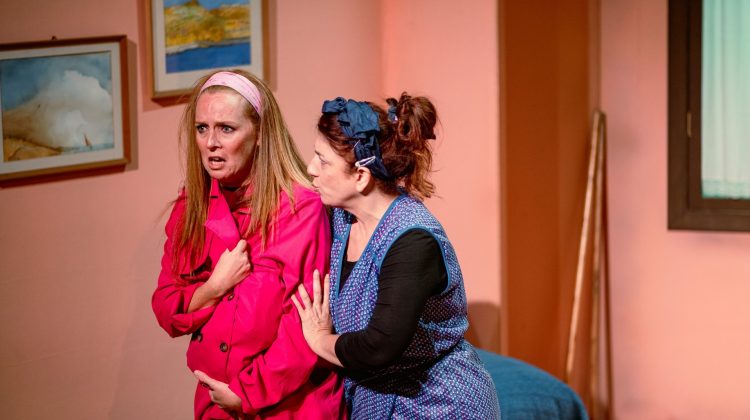
If I didn’t know that Dario Fo’s No Pay? No Way! was written in the 1970s I’d have thought it was a contemporary satire, based on the year’s headlines and the state of pretty much every European country. But no, Fo’s absurdist and kind of surreal plotline was written more than 50 years ago, which just goes to show that plus ça change…
The play is currently being staged by FM Theatre at Theatre Next Door, with a cast of theatre veterans and Chris Gatt directing. I watched it on opening night and, while there were a significant number of dropped lines and missed light cues, I was too busy laughing to be much bothered by these.
Because the play is indeed painfully funny. Absurdist comedy only works when it’s done really well, and in this case it was. The cast features Pia Zammit in the role of Antonia, the main driver of all the action, who takes part in an impromptu protest when the price of groceries doubles overnight and an entire battalion of women decide to walk out without paying. Roped into the shenanigans is her friend Margerita, played to excellent comical effect by Faye Paris.
Edward Mercieca borrows heavily from his legacy as panto dame for his role as Antonia’s husband, pulling off a mixture of naivete and hapless masculinity much to the roaring delight of the audience. Nathan Brimmer is Margerita’s husband (disclaimer: I won’t be critiquing his role due to our close personal connection), while Malcolm Galea’s multiple appearances as various police-offers, an undertaker and a couple of other incidental roles were magnificent. Many of Galea’s monologues are a breathless tour-de-force that left everyone squealing with laughter.
Because the play is hilarious, there’s no two ways about it. It’s impossible not to laugh at Zammit bringing down the patriarchy, one stolen carrot and one ridiculous lie at a time. Paris, in the role of unfortunate BFF, emotes comedy even without any lines – at one point, one twitch of the eyebrow in Zammit’s direction was enough to bring the house down. She also excels at physicality. The ‘olive’ scene (and I will reveal no more) could so easily have ended up being cringe, but Paris handled it masterfully, thanks in no small part to good direction.
It’s a pity that some of the scenes veered too heavily towards panto, although given the strong legacy that both director Chris Gatt and the cast have in this respect, perhaps it’s unsurprising. The play is set in Italy, and the cast use the occasional phrase in Italian. This comes across as too forced, particularly in the scene where we hear Mercieca holding a conversation with an ‘invisible’ neighbour. It doesn’t help that the neighbour’s dialogue is transmitted through the theatre’s surround speakers, which was a weird directing choice.
While the play is non-stop funny, it’s impossible to ignore its intrinsic sadness. Each line can be described as comedy gold with an underlying subtext of human despair. Because of course, when you think about it, there’s nothing funny about not being able to afford to pay the rent or buy food. And it’s a situation that is currently all too real for too many.
Marieke Hardy’s adaptation of the original text gives the script a much stronger feminist slant. Even here, it’s dismaying to see how very little has changed. Mansplaining and controlling women’s bodies remains very much a thing and I’m pretty sure that many of the women in the audience were sharing my same unhappy thoughts.
Fo was known for adapting his scripts to include references to current happenings. I felt that this part of the adaptation could have been done better than simply shouting out the names of local, compromised politicians without any nuance. The overall effect was more Comedy Knights than Fo.
That said, this was a very timely and solid adaptation of an evergreen classic, and it’s certainly a very strong start to the start of the season for Theatre Next Door. More to the point, it offers an excellent night out and you’re guaranteed non-stop laughter. Tickets here.
If you’d like to read more features about Maltese culture events, check out this review of Aura, Musical in the Dark or Dik is-Sigra f’Nofs ta’ Triq.
Affiliate/Advertising Disclaimer: How I Carry Out Reviews
I received no payment for this review and I used press review tickets. The opinions expressed here are purely my own and the theatre company had no input/control over what I wrote. No affiliate links are included in this review.To learn more about my policies and my reviewing process, visit my Affiliate/Advertising disclosure page.
